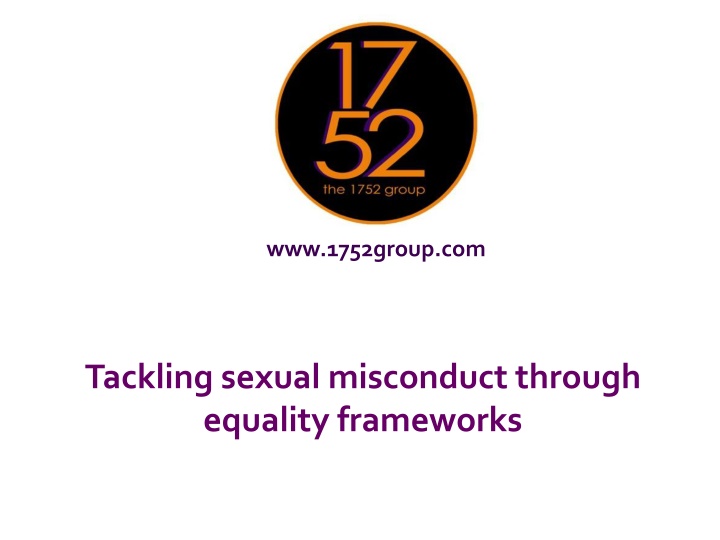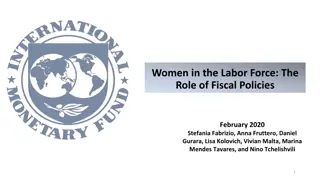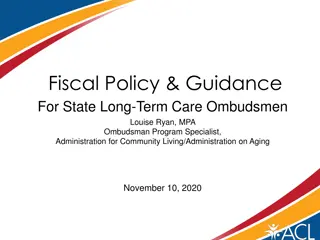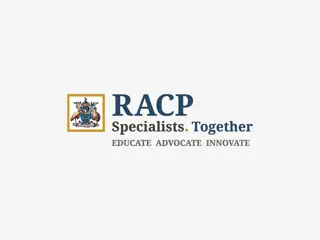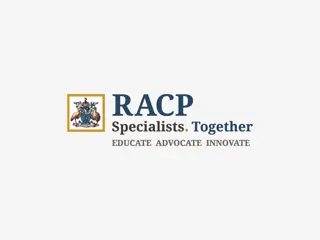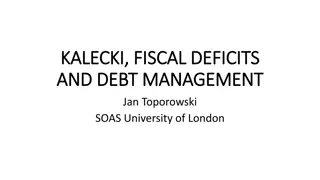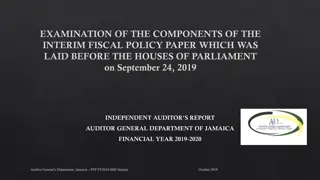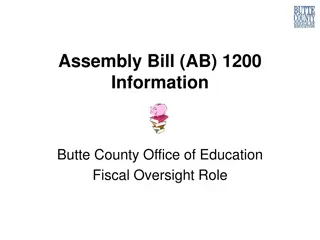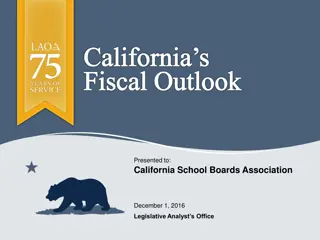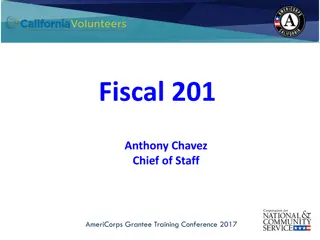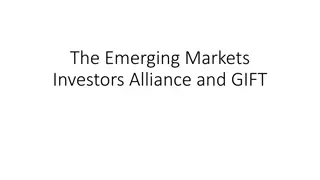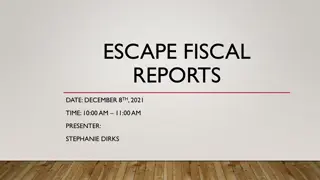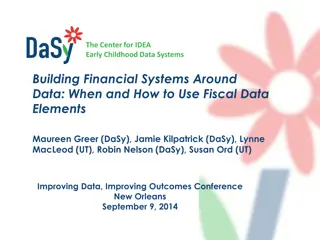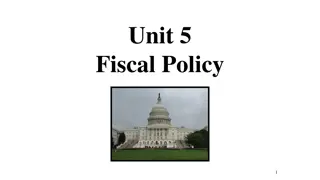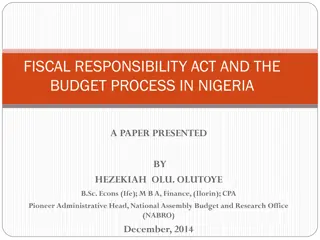Divisional Presentation to Fiscal Policies Committee
In this presentation template, information is provided on various aspects including the mission alignment, staffing details, historical staffing data, divisional structure, and budget breakdown. Key points such as supporting the university's mission pillars, staff statistics, and funding allocation are covered in a concise manner. The presentation is designed for the Fiscal Policies Committee of the CI Academic Senate.
Download Presentation

Please find below an Image/Link to download the presentation.
The content on the website is provided AS IS for your information and personal use only. It may not be sold, licensed, or shared on other websites without obtaining consent from the author.If you encounter any issues during the download, it is possible that the publisher has removed the file from their server.
You are allowed to download the files provided on this website for personal or commercial use, subject to the condition that they are used lawfully. All files are the property of their respective owners.
The content on the website is provided AS IS for your information and personal use only. It may not be sold, licensed, or shared on other websites without obtaining consent from the author.
E N D
Presentation Transcript
www.1752group.com Tackling sexual misconduct through equality frameworks
The 1752 Group Dr Tiffany Page The 1752 Group is a UK-based consulting and strategy organisation established in response to the prevalence of staff-to-student sexual misconduct and harassment within UK higher education.
The 1752 Group We are committed to: UK-wide national framework & policy on staff sexual misconduct National data reporting mechanisms Developing research on staff sexual misconduct in higher education Working with national bodies and universities to implement long-lasting change
Why did we establish The 1752 Group? Working since 2012 on cases of staff sexual misconduct Came up against a culture that condoned misconduct and protected academic staff Made more difficult by a lack of university policies and processes Realised the serious and long-term impact on student well-being and ability to complete studies Organised a conference and discovered that this was a UK-wide issue that wasn t being addressed at a national or local level Recognised the lack of research and a need for a more collaborative approach at a national level
What is sexual misconduct? It involves forms of power enacted by academic and professional staff in their relations with students (this can also occur in relations with other staff members) Sexual harassment is one of many behaviours encompassed by misconduct, which includes assault, grooming, bullying, sexual invitations, sexual comments, creation of atmospheres of discomfort, promised resources in exchange for sexual access It is condoned and supported through organisational cultures It raises issues of unequal relationships, consent, and the prevention of gender equality Relationships can change over time to become abusive.
Effects of sexual misconduct on survivors Effects are compounded by other ways in which students may be marginalised: for example through race, ability, sexuality, gender identity Self-blame; uncertainty as to whether conduct violations occurred Discouragement from reporting; subjected to victim narratives produced about the perpetrators Fear of retaliation from disclosing Impact of long drawn out complaints procedures that are not fit for purpose Supportive staff can form roadblocks that create further distress for students Experiences can lead to PTSD and/or other mental health issues Disengagement from studies Loss of academic confidence; impact on employment Withdrawal of institutional support after complaints are resolved can lead to difficulties in completing studies
Gender equality awards Universities have legal responsibilities as public bodies and to ensure the right to equal access to education Currently no national framework or guidelines No national statistics or data on prevalence One means to enact change is through equality frameworks Include sexual violence and gender based violence into such frameworks Inclusion could occur within Organisation and Culture
Why this is important Sexual misconduct occurs in organisational cultures that condone and support it. These cultures perpetuate the lack of gender equality in higher education through: Pervasive sexism and misogyny as well as racism, transphobia, homophobia and ableism. An absence of professional codes of conduct Leadership performed at a distance A lack or use of ineffective policies, procedures and support services Bullying and harassment of academic staff; Instilling a fear of speaking out; tied to the prevalence of short-term contracts Resulting pastoral care performed predominately by staff identifying as women Power relations that support those deemed to have value to the institution Recent evidence: Imperial College report; University of Sussex report; cases at University of Winchester, Goldsmiths
Imperial College report It was suggested that the College s culture intersected with and exacerbated equality and diversity issues and hindered the College s efforts to ensure that all students and staff were able to thrive. It was noted that the College has a portfolio of equality and diversity policies and initiatives which were known of and viewed positively by some participants, for instance Supporting People and Imperial Expectations, training around recruitment and unconscious bias, the various staff networks and clubs and societies for students, and units such as the Postdoc Development Centre, the Disability Service and the Equality & Diversity Unit. Female academics were especially appreciative of support with maternity leaves through the Elsie Widdowson Fellowship, and the College s participation in the Athena SWAN scheme. However, many of the participants felt that these activities had failed to make inroads into problematic aspects of the institution s culture. Some participants felt that Athena SWAN had merely scratched the surface of issues or had just provided a veneer which concealed continuing inequalities and that events such as the annual Athena SWAN lecture were little more than a box ticking exercise.
Limitations of equality frameworks Imperial College report conducted by Changing University Cultures. https://chucl.com The presence of diversity policies and initiatives, including Athena SWAN, can provide a mask to prevent changes to institutional culture. Top-down policies do not denote actual cultural change. It is crucial to understand the differences between what policy dictates and how culture operates. Athena SWAN and other equality frameworks currently do not measure initiatives taken to prevent sexual violence and gender based violence so what needs to change?
Why is this difficult? The materials provided by Athena SWAN for institutional applications include a section on organisation and culture . The detailed guidelines currently do not refer to universities providing evidence for how they address gender based violence and sexual violence explicitly. Currently focused more on staff rather than students (at institution level) This is not to say that institutions cannot include this data in their applications. However, institutions are unlikely to possess robust data in this area, and therefore little incentive to address this area. Evidence-based mechanisms are a restriction o Absence of data recording and reporting on sexual misconduct o Generic rather than specific institutional policies and procedures that do not capture this data o Many universities are still uncertain how to proceed with sexual misconduct reporting and complaints
What institutions can do a solid foundation for eliminating gender bias and developing an inclusive culture that values all staff. The assessment of gender equality in an institution should include the ways in which an institution both acknowledges, and addresses sexual violence and gender based violence through an intersectional approach.
What institutions can do Quantitative measures could include: Data reporting on sexual violence and gender based complaints, broken down (but this also hides issues of under reporting and silencing) Data reporting on interruptions and withdrawal from studies for undergraduate and postgraduate students Culture surveys Tracking of PhD completion rates
What institutions can do Qualitative evidence of initiatives could include: Implementing a professional code of conduct Implementing a clear sexual misconduct policy including a policy on staff-student relationships Separate reporting and complaints procedure/s for sexual misconduct/sexual violence/hate crimes/gender based violence Enabling anonymous reporting
What institutions can do Activities could include: Central data recording and archival Organizational culture change initiatives Staff and student training on disclosures and bystander awareness Improving provision of support services; partnerships with local organisations such as Rape Crisis Specific funding allocated to an officer/office to prevent sexual and gender based violence
How to start 1. 2. Recognise & publically acknowledge there is a problem Recognise institutions often do not have the expertise to deal with this Provide leadership from senior management dedicate a Champion Work in collaboration with other institutions Develop specific policies and reporting procedures on sexual misconduct Invest: dialogue; training; provide a dedicated officer Fund research: know what is happening within the institution and nationally; communicate & share with other universities 3. 4. 5. 6. 7.
Work needed on a national level Campaigns and national surveys Organisations such as the UUK and Equality Challenge Unit need to conduct or fund research and develop best practice A national office/database for data collection and prevention initiatives; funding for independent officers on campus A binding code of conduct for university teaching staff, which could be linked to professional registrations such as the HEA Funding opportunities for quantitative and qualitative research
www.1752group.com tiffany.page@1752group.com
